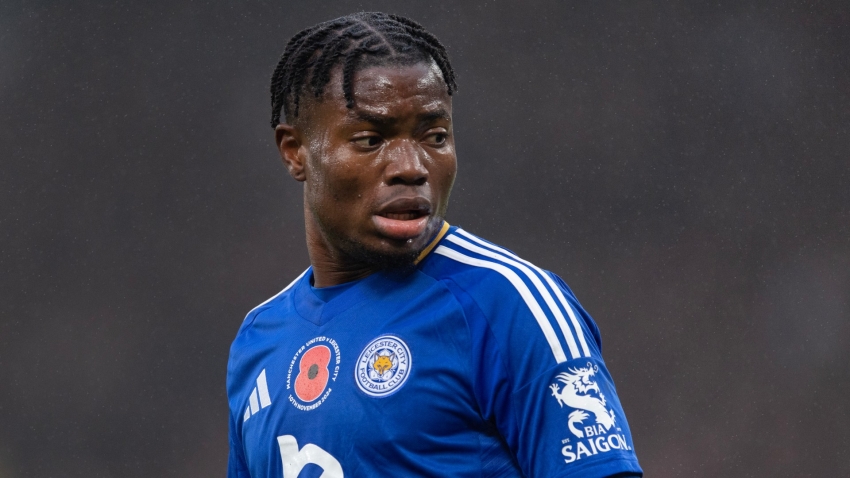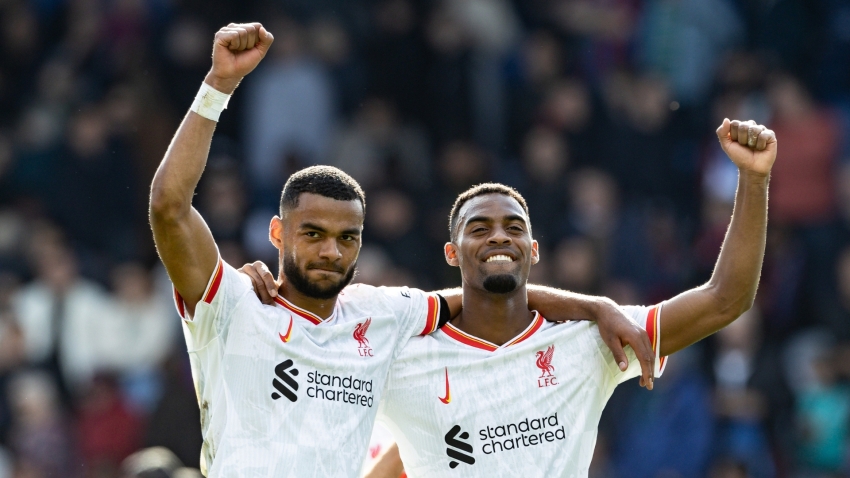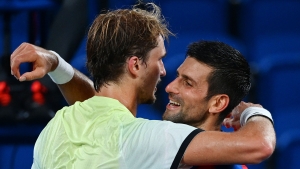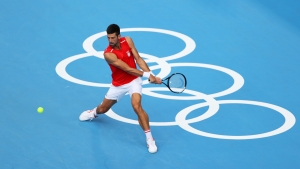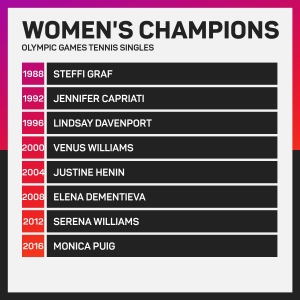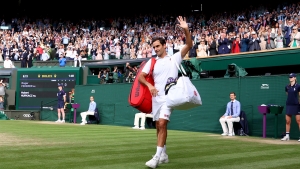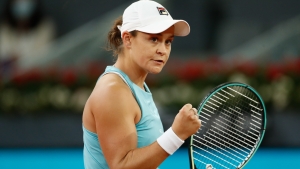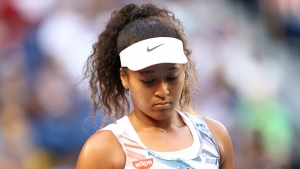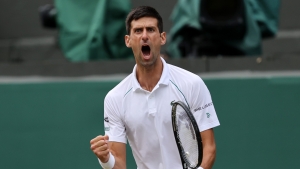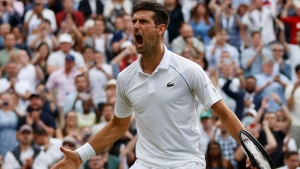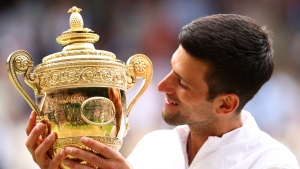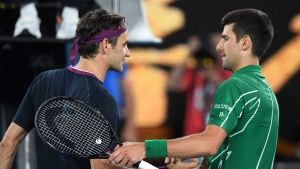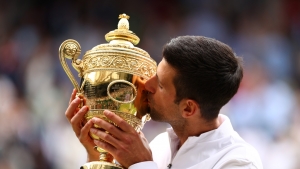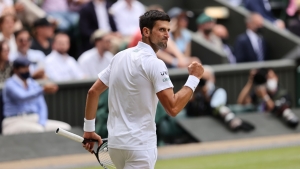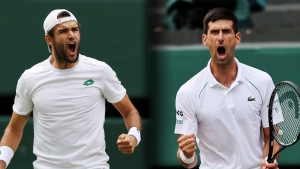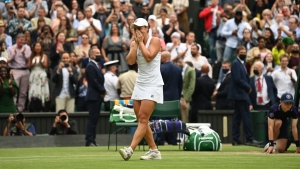A golden age deserves a Golden Slam, and who would bet against Novak Djokovic achieving that now?
This extraordinary Serbian has chased down Roger Federer and Rafael Nadal in the grand slam race, joining them on 20 majors as he became the first $150million man in tennis.
When he raced up to the players' box and butted heads out of joy with Goran Ivanisevic, his coach, Djokovic was living out another magnificent moment in a career jammed with them.
This is now three successive Wimbledon titles and six in all at the All England Club for Djokovic.
More than that though, he is the first player since Rod Laver in 1969 to win the first three grand slams of a season, and the Olympic Games and US Open are still to come.
Steffi Graf is the only player in tennis history to have won all four majors and an Olympic gold in the same year, the great German doing so in 1988. Graf could soon have company in the record books, because Djokovic looks unstoppable.
When Matteo Berrettini snatched the opening set here on a tie-break, there were omens that said it would be the Italian's day. The grand slam final newcomer had a 22-0 winning record from the times when he previously won the first set in grass-court matches.
Djokovic had other ideas.
The 34-year-old is a case study in triumphant self-improvement, forever seeking ways to bolster his chances of winning, whether it be veganism, meditation or relentless hard yakka on the training court.
He wound up many with his views on vaccinations, and triggered others, including Federer, Nadal and Andy Murray, last August by fronting a new Professional Tennis Players Association at a time when the sport's existing off-court leaders were battling to cope amid the pandemic.
And he will never be as loved on Centre Court as Federer, Nadal and Murray, those other members of the Big Four. It's something he is coming to terms with.
"He means well but sometimes he doesn't come across," said Boris Becker on the BBC.
But what Djokovic does on court remains wondrous and his achievements are reaching new heights.
In grand slam terms, it is now a three-man crowd on 20 titles. Tennis can throw up surprises, but Djokovic is a firm favourite to break away and finish alone on top of the pile.
"It means none of us will stop, that's what it means," Djokovic said, as he reflected on matching his great rivals. "They're legends of our sport and they are the two most important players that I ever faced in my career. They are the reason where I am today.
"They helped me realise what I need to do to get stronger mentally, physically and tactically."
Federer could yet decide the time has come to quit, perhaps even before the US Open comes around, while Nadal, when he returns from his mid-season hiatus, may rise to the challenge in New York.
Yet Djokovic made his intentions quite clear when asked about the prospect of sealing a clean sweep of 2021's biggest titles at Flushing Meadows.
"I could defijnitely envision that happening," he said. "I'm hoping I'm going to give it a shot. "I'm in great form, I'm obviously playing well, and playing my best tennis at grand slams is the highest priority I have at this stage of my career, so let's keep it going."
Twenty years ago, wild card Ivanisevic won this title behind some of the greatest serving ever witnessed.
Against Berrettini and throughout Wimbledon, Djokovic demonstrated how much that shot has become such a vital play for him too.
Djokovic came into this title match with the best percentage record of first-serve points won in the tournament (85 per cent). Berrettini had served the most aces, but Djokovic sat a healthy third on that list too.
Like Cristiano Ronaldo in football, Djokovic has found new ways to prolong his stay at the top of his profession, and Ivanisevic has had a big part to play in that over the past two years.
Djokovic had 209 aces from 30 matches this year before launching into his Wimbledon mission, and he has added 68 in seven matches over this fortnight.
That represents a big step-up from where he was five years ago, when in a year that saw him win the Australian and French Opens and reach the US Open final he served a modest 276 aces in 72 matches. He has gone from serving close to four aces a match to seven. And while he will never launches aces in the manner of an Ivanisevic, he is still finding ways to develop his game.
Ronaldo has become increasingly a penalty area predator rather than a player who causes chaos across the football pitch. From the 2008-09 season to the 2013-14 campaign, Ronaldo scored at least eight goals per season from outside the 18-yard box, but over the past four seasons the most he has managed has been three.
Where once many of his goals came from fast breaks out of defence, now those are collectors' items.
The greatest find a way to sustain greatness and Djokovic is similarly working on building up the weaponry that allows him to extend his career well into his mid-thirties.
He won 79 per cent of first-serve points against Berrettini, who had a success rate of 76 per cent. And although he was out-aced 16-5 on this occasion, it was Djokovic's consistency that won out.
His athleticism remains astonishing. Trailing 3-2 in the fourth set, Djokovic dashed from the baseline to the net to track down a drop shot that would have beaten most, but he clipped the ball across court for a winner that even had Berrettini smiling.
The game was not yet up, but in essence it was. How do you beat this guy?
Djokovic now owns a 20-10 win-loss record in grand slam finals. Only Federer, who has reached 31 of those matches, has played in more.
Djokovic has won seven of the past eight slam finals he has contested. He has triumphed in six of his seven Wimbledon finals – the exception being his 2013 loss to Murray.
Tokyo awaits now, and then New York.
All that prize-money, all that he has achieved already, and Djokovic remains ravenous for more.










